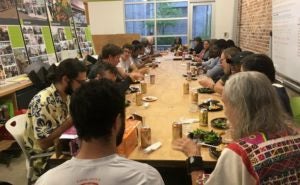
The Tulane Mellon Graduate Program in Community-Engaged Scholarship is an initiative of Tulane’s Office of the Provost and School of Liberal Arts. The program was launched in 2017 in conjunction with a grant from the Andrew W. Mellon Foundation, following three years of pilot graduate programs in community engagement at Tulane. Through the “Transforming Graduate Education through Engaging the Community” grant, Tulane is building on its strength as a campus rich in community-engaged faculty from a wide range of departments and its strength as an institution with over six hundred established community partnerships in New Orleans and globally.
The Tulane Mellon Graduate Program supports graduate students doing public humanities work and aims to:
- build a public humanities program that gradually persuades skeptics about the capacities of such work to add new dimensions to graduate student education and enrich their home disciplines;
- bring cultural and community leaders from outside academia into the core of a graduate program and value diverse knowers and ways of knowing;
- be aware of and work against power structures of various sorts that can inhibit healthy relationships and genuine collaboration within academic communities;
- work with graduate students to help them develop public humanities projects that connect with the graduate students’ studies from their home departments, making the work more sustainable over the course of a career;
- facilitate the development of new skills and experiences through substantial collaborative projects for the public good, complete with budgets, MOUs, and evaluation systems;
- design a graduate program in public humanities that helps to build more substantial networks of universities, artists, and governments, as well as cultural and community organizations throughout New Orleans and the Gulf South.
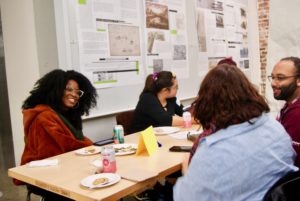
A distinctive feature of the Tulane Mellon Graduate Program is how it values community organizers’ knowledge and ways of knowing, as well how it offers graduate students a unique space built on reciprocal and trusting relationships. Our 2022 evaluation, which can be downloaded here, highlights this feature as sufficiently unique when compared to traditional graduate studies.
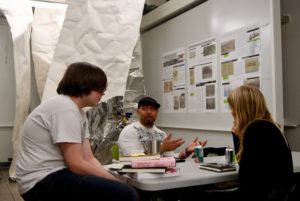
The program begins before classes start in August with a two-day retreat featuring story circles that work against the power dynamics of academia and aim to establish a more democratic atmosphere where participants can be themselves and establish honest and enduring bonds. In addition to regular meetings with community and faculty advisors, including monthly Tuesday night dinners, two one-credit courses build on their conversations about publicly engaged humanities with theories, methods, best practices, and examples during the following two semesters. These courses are designed to be rigorous but not onerous; they are set up to allow graduate students to take them in addition to their regular course loads without slowing progress toward their graduate degrees.
In addition to coursework and regular meetings with faculty and community advisors, graduate students pursue collaborative projects in publicly engaged scholarship. These projects resonate with graduate students’ personal and scholarly interests and are grounded in sustained collaboration with a community partner. Graduate Fellows are provided a stipend and budget for their projects that include compensation for community partners, additional mentors, travel, and supplies.
During the final semester of the two-year certificate program, graduate fellows work with their cohort to reflect upon, evaluate, and develop the next steps for their publicly engaged projects as part of a third one-hour course which culminates in the production of a portfolio and a public presentation during a student-planned symposium. Along the way, students also take three graduate courses designated as having a community-engaged component and receive a certificate when they complete them.
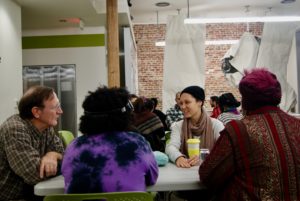
Technology and Digital Humanities Lab at Newcomb Institute of Tulane University
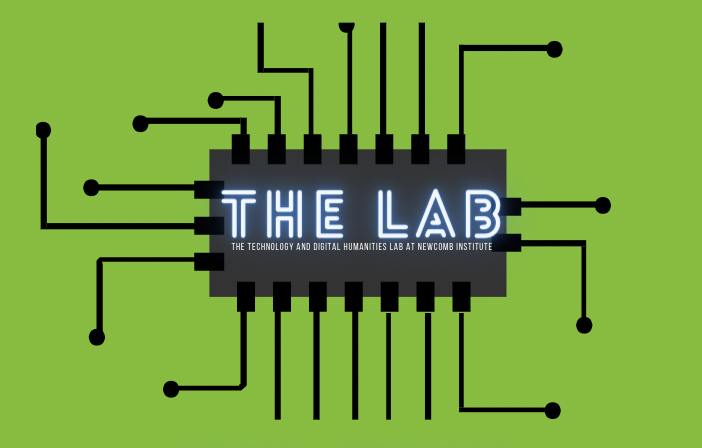
Lab Director
Jacquelyne Thoni Howard, Ph.D
Lab Manager
Rachel Tabor
Digital Research Internship Program
Product Developers
Marisa Long & Wendy Yang
Interns
| Ananya Anand | Helena Wang | Danielle Walder | Hannah Bartels |
| Claire Ramsay | Chloe Uhls | Winna Xia | Isabelle Haines |
| Meghan Nagia | Zoe Oboler | Isabella Blair | Rhea Majumdar |
| Ifeoma Osakwe | Catherine Hu | Kristen Osborne | Madeline Nellis |
| Evan Hendrickson | John Caswell Ellis (Collat Media Lab) | Sam DeMarinis | Tess Kleanthous |
Newcomb Institute of Tulane University funded the internships of the Collat Digital Media Interns and Digital Research Interns.
